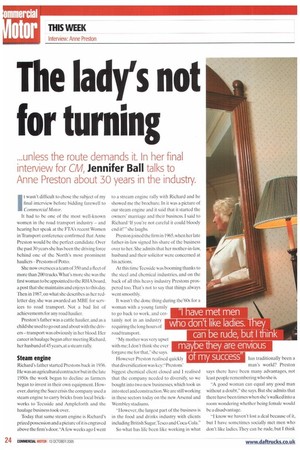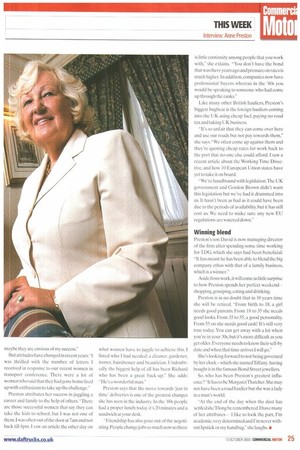The lady's not for turning
Page 24

Page 25

If you've noticed an error in this article please click here to report it so we can fix it.
...unless the route demands it. In her final
interview for CM, Jennifer Ball talks to Anne Preston about 30 years in the industry.
It wasn't difficult to chose the subject of my final interview before bidding farewell to Commercial Motor. It had to be one of the most well-known women in the road transport industry — and hearing her speak at the FTA's recent Women in Transport conference confirmed that Anne Preston would be the perfect candidate. Over the past 30 years she has been the driving force behind one of the North's most prominent hauliers — Prestons of Potto.
She now oversees a team of 350 and a fleet of more than 200 trucks. What's more she was the first woman to be appointed to the RHA board, a post that she maintains and enjoys to this day. Then in 1987, on what she describes as her redletter day, she was awarded an MBE for services to road transport. Not a bad list of achievements for any road haulier.
Preston's father was a cattle haulier, and as a child she used to go out and about with the drivers — transport was obviously in her blood. Her career in haulage began after meeting Richard, her husband of 45 years, at a steam rally.
Steam engine
Richard's father started Prestons back in 1936. He was an agricultural contractor but in the late 1950s the work began to decline as farmers began to invest in their own equipment. However, during the Suez crisis the company used a steam engine to carry bricks from local brickworks to Teesside and Ample forth and the haulage business took over.
Today that same steam engine is Richard's prized possession and a picture of it is engraved above the firm's door, 'A few weeks ago I went to a stream engine rally with Richard and he showed me the brochure. In it was a picture of our steam engine and it said that it started the owners' marriage and their business. I said to Richard If you're not careful it could bloody end it!" she laughs.
Preston joined the firm in 1965,when her late father-in-law signed his share of the business over to her. She admits that her mother-in-law, husband and their solicitor were concerned at his actions.
At this time Teesside was booming thanks to the steel and chemical industries, and on the back of all this heavy industry Prestons prospered too. That's not to say that things always went smoothly.
It wasn't the done thing during the'60s for a woman with a young family to go back to work, and certainly not in an industry requiring the long hours of road transport.
"My mother was very upset with me; I don't think she ever forgave me for that," she says.
However Preston realised quickly that diversification was key:"Prestons' biggest chemical client closed and I realised that the company needed to diversify, so we bought into two new businesses, which took us into steel and construction.We are still working in these sectors today on the new Arsenal and
Wembley stadiums.
"However, the largest part of the business is in the food and drinks industry with clients including British Sugar,Tesco and Coca-Cola."
So what has life been like working in what has traditionally been a man's world? Preston says there have been many advantages, not least people remembering who she is.
"A good woman can equal any good man without a doubt," she says. But she admits that there have been times when she's walked into a room wondering whether being female would be a disadvantage.
"I know we haven't lost a deal because of it, but I have sometimes socially met men who don't like ladies. They can be rude, hut! think maybe they are envious of my success."
But attitudes have changed in recent years." was thrilled with the number of letters I received in response to our recent women in transport conference. There were a lot of women who said that they had gone home fired up with enthusiasm to take up the challenge: Preston attributes her success in juggling a career and family to the help of others. "There are those successful women that say they can take the kids to school, but 1 was not one of them.! was often out of the door at 7am and not back till 8pm. I saw an article the other day on what women have to juggle to achieve this. T listed who I had needed: a cleaner, gardener, ironer, hairdresser and beautician. ilndoubtedly the biggest help of all has been Richard who has been a great back-up." She adds: "He's a wonderful man."
Preston says that the move towards 'just in time' deliveries is one of the greatest changes she has seen in the industry. In the '60s people had a proper lunch: today it's 20 minutes and a sandwich at your desk.
"Friendship has also gone out of the negotiating. People change jobs so much now so there is little continuity among people that you work with," she exlains. "You don't have the bond that was there years ago and pressure on rates is much higher. In addition, companies now have professional buyers whereas in the '60s you would be speaking to someone who had come up through the ranks."
Like many other British hauliers, Preston's biggest bugbear is the foreign hauliers coming into the UK using cheap fuel, paying no road tax and taking UK business.
"It's so unfair that they can come over here and use our roads but not pay towards them." she says. "We often come up against them and they're quoting cheap rates for work back to the port that no-one else could allbrd. I saw a recent article about the Working Time Directive, and how 10 European Union states have yet to take it on board.
"We're handbound with legislation.The UK government and Gordon Brown didn't want this legislation but we've had it drummed into us. It hasn't been as bad as it could have been due to the periods of availability, hut it has still cost us. We need to make sure any new EU regulations are watered down."
Winning blend
Preston's son David is now managing director of the firm after spending some time working for TDG, which she Says had been benelicial: "It has meant he has been able to blend the big company ethos with that of a family business, which is a winner."
Aside from work, it will come as little surprise to how Preston spends her perfect weekend — shopping, gossiping, eating and drinking.
Preston is in no doubt that in 10 years time she will be retired. "From birth to 18, a girl needs good parents. From 18 to 35 she needs good looks. From 35 to 55, a good personality. From 55 on she needs good cash! It's still very true today. You can get away with a lot when you're in your 30s, but it's more difficult as you get older. Everyone needs to know their sell-by date and when that time arrives I will go."
She's looking forward to not being governed by her clock — which she named Tiffany, having bought it in the famous Bond Street jewellers.
So, who has been Preston's greatest influence? "It has to be Margaret Thatcher. She may not have been a road haulier but she was a lady in a man's world.
"At the end of the day when the dust has settled she'll long be remembered.! have many of her attributes — I like to look the part. I'm academic, very determined and I'm never without lipstick or my handbag," she laughs. •












































































































































































































